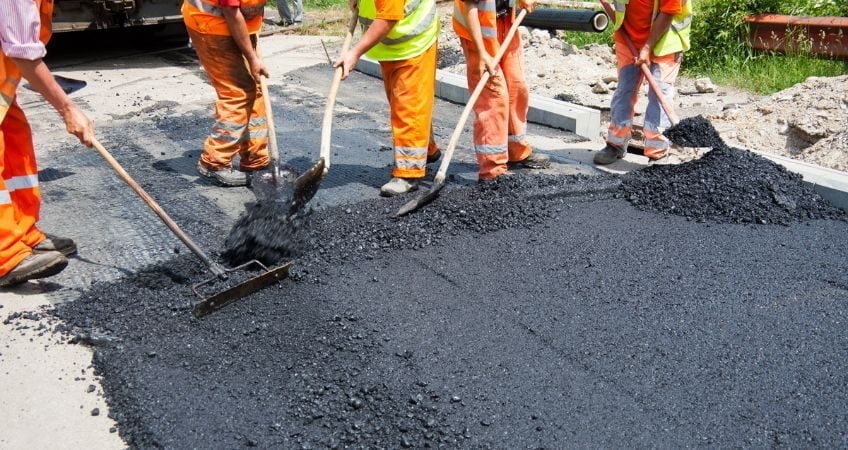Asphalt Paving Cost Estimate: Asphalt installation projects is one of the most cost-effective options for your driveway. The national average price to replace an old road for a new one ranges anywhere from around $2,000 to $6,000, depending on the length and timeline of installation. While that may seem expensive, the cost is actually much cheaper than concrete.
Asphalt paving costs $3 to $7 per square foot installed. Follow us for more details Please!!
Asphalt driveway paving cost.
| Size | Square feet | Average cost |
|---|---|---|
| 12’x100′ Road | 1,200 | $3,500 – $8,500 |
| 12’x500′ Road | 6,000 | $17,500 – $42,500 |
| 12’x25′ Parking space | 300 | $900 – $2,100 |
| 10-Car Parking lot | 3,000 | $9,000 – $21,000 |
Assumptions:
- Asphalt cost: $4.00 per square foot. This can vary depending on how thick it’s applied and the region in which you live.
- Special features: The calculator above assumes the cost of a Chip Seal top coat, stamped surface or color asphalt at $4.00 per square foot. This is probably a tad on the high side, but is within range.
- Gravel: We assume gravel will cost $2.50 per square foot. Again, this can vary according to gravel thickness, quality and region.
- Excavation: We assume an excavation cost, if necessary, at $2,000. Again, this can vary considerably according to amount of ground to excavate, slopes, terrain material, region, etc.
Factors that Impact the Cost of Asphalt
Asphalt Type
Asphalt Paving Cost Estimate: An asphalt calculator will use the type of aggregates and materials used in your surface to determine its true cost. Asphalt type includes aggregate material and technology used to bind the content together.
The aggregates used in asphalt surfaces typically include hard, inert materials such as gravel, slag, crushed stone, rock dust, or sand. These aggregates are the load-supporting components of the surface that combine with binders to cement the material into one combination.
Most asphalt surfaces use a hot mix with some recycled aggregates, if not entirely all recycled materials. However, some asphalt contractors recommend different asphalt mixes depending on the location, traffic, and differences in your situation. The three major types of asphalt mixes are hot, warm, and cold.
Hot mix asphalt
Hot mix asphalt is heated and poured at temperatures ranging from 300 to 350 degrees Fahrenheit. It is the most common asphalt used for roadways. A hot mix is also an inexpensive option, thanks to its recycled materials. It is also flexible, which makes it easy to install and repair, reducing costs.

Warm mixes are manufactured between 200-250 degrees and use fewer fossil fuel resources in the manufacturing process. Asphalt contractors will use this application technique because it is less expensive yet more flexible as it cools more slowly than a hot mix. Warm mixes can also ship to locations further-out because contractors can regulate the temperature more easily.
If you are looking for the most affordable repair, cold mixes are a great option. Cold mix asphalt is used mostly for repairs like small cracks, potholes, and patches. It doesn’t require heating for application. Cold mix asphalt is not nearly as strong as a hot mix but works well for small fixes or temporary repairs.
Working with an asphalt contractor, you can consider the differences in your project to customize a distinct mixture. You will need an asphalt mixture that is stiff yet resistant to distortion, as well as flexible and strong enough to resist cracking.
Stiffness and resistance
The stiffness and resistance will allow the asphalt to handle applied pressure from motor vehicles. Simultaneously, flexibility prevents most of the damage caused by contrasting pressures exerted while driving on the asphalt.
Along with the type of asphalt mixture, there are different aggregates you can combine for your surface material, including recycled, porous, and colored. Most asphalt surfaces contain some recycled material.
Since asphalt is entirely recyclable, it is common for asphalt mixtures to contain mostly recycled materials to keep costs down. The cost of recycled asphalt ranges from $1 to $4 a square foot.
Other mixtures use newer material along with recycled components. Porous asphalt employs aggregate technology that allows water to run through the asphalt rather than staying on the surface. It works well in locations with heavy rainfall. However, it isn’t always the optimal choice for areas that experience freezing temperatures.
Colored asphalt
Colored asphalt is a popular option for decorative driveways. This asphalt surface type is available in a wide range of shades and hues. Asphalt companies will add pigment to a hot mix to achieve the chosen color. The cost of colored asphalts ranges between $5 to $7 a square foot on average.
You can discover the right asphalt solution for your surface by working with a professional asphalt contractor. They will help determine which asphalt type will meet the needs of your project, whether it is a high traffic road, parking lot, or another roadway surface.
Asphalt Grade
Another determining factor of how much asphalt costs is grade. The most commonly used asphalt grading includes base grade, top-grade, and the commercial top grade. Each of these grades varies slightly in cost, which impacts the total surfacing price.
The base grade is a rough asphalt that contains stone aggregate or gravel. It is usually the bottom layer of the surface, but it also works in lighter traffic areas as a stand-alone layer of asphalt.
The top asphalt grade costs $1-$4 per square foot. It is a durable asphalt layer that contains a higher level of sand and smooth particles. It is finer than the base coat, adding to its long-lasting properties. Unlike the base coat, it doesn’t work on its own but requires a base coat.
Asphalt contractors typically recommend a top grade for extremely high traffic roadways. However, it is the most expensive option. It costs about $3 – $5 a square foot. It contains more rock than other grades, making it less smooth than a top grade. However, the rockier surface impacts quality, making it perform better in the long term.
Is asphalt the same as blacktop?
Although people use the terms interchangeably, there is a difference between the two. The materials that are used to make blacktop and asphalt are the same. Both are made from two ingredients: bitumen and crushed stone. The difference lies in how those ingredients are combined to make the final product.
Asphalt Paving Installation Time
Once the base preparation is complete, an average driveway may begin looking like a finished product is as little as 40 minutes.
What is the best base for asphalt?
Strong blacktop driveways are typically built using crushed angular gravel as a base. This gravel needs to be a minimum of 6 inches thick for light vehicle traffic such as cars and pickup trucks.
Can you pour asphalt over gravel?
In short, yes, you can blacktop over gravel. To convert a gravel driveway to asphalt, there are a few steps that need to be followed, but the project can be completed relatively easily.
Do you need gravel under asphalt?
A bed of gravel 6 to 8 inches deep is usually installed underneath an asphalt driveway. If the asphalt is poured before the gravel settles, the driveway will crack and split as the stones beneath it settle and shift. … This settles the gravel quickly and allows the driveway installation to proceed without delay.

